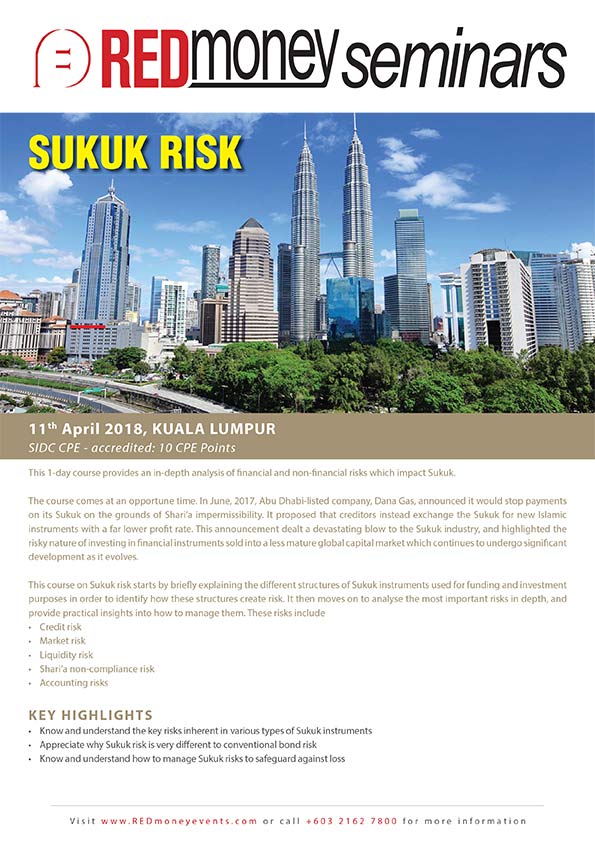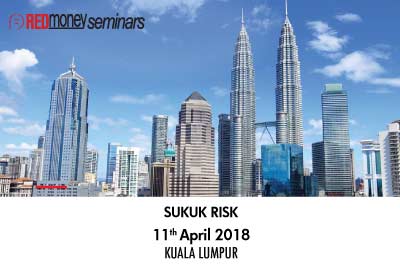
About The Seminar
This 1-day course provides an in-depth analysis of financial and non-financial risks which impact Sukuk.
The course comes at an opportune time. In June, 2017, Abu Dhabi-listed company, Dana Gas, announced it would stop payments on its Sukuk on the grounds of Shari’a impermissibility. It proposed that creditors instead exchange the Sukuk for new Islamic instruments with a far lower profit rate. This announcement dealt a devastating blow to the Sukuk industry, and highlighted the risky nature of investing in financial instruments sold into a less mature global capital market which continues to undergo significant development as it evolves.
This course on Sukuk risk starts by briefly explaining the different structures of Sukuk instruments used for funding and investment purposes in order to identify how these structures create risk. It then moves on to analyse the most important risks in depth, and provide practical insights into how to manage them. These risks include
- Credit risk
- Market risk
- Liquidity risk
- Accounting risks
KEY HIGHLIGHTS
- Know and understand the key risks inherent in various types of Sukuk instruments
- Appreciate why Sukuk risk is very different to conventional bond risk
- Know and understand how to manage Sukuk risks to safeguard against loss
Date: 11th April 2018
Venue: KUALA LUMPUR
- Chief financial officers, heads of finance, and finance officers
- Chief risk officers, risk managers, and risk analysts
- Treasurers and treasury managers
- Risk Mangers
- Capital market deal originators and structurers
- Fixed income portfolio managers and other fund managers
- Ratings agency analysts
Early bird : RM1,799
Standard: RM1,999
Register before 9th March 2018
If you are looking for an in-house training program or wish to send a group to an existing public program, kindly please contact Andrew Tebbutt at [email protected] or +603 2162 7802.
Learn More
Kindly complete the registration form and email to [email protected] or fax +603 2162 7810
For enquiries please contact:
Normariya Sariman
Account Manager, REDmoney Seminars
[email protected]
Direct Line: +603 2162 7800 ext 44
Ramesh Kalimuthu
Events Sales Director
[email protected]
Direct Line: +603 2162 7800 ext 65
Fax: +603 2162 7810
For sponsorship & speaking opportunities:
Andrew Tebbutt
Managing Director
[email protected]
Direct Line: +603 2162 7802
For marketing and media enquiries
Govina Selvanthran
Marketing Manager
[email protected]
Direct Line: +603 2162 7800 ext 22
Seminar Agenda
Session One: Sukuk instruments
Overview of Sukuk
- What Sukuk are, and what Sukuk are not
- How are Sukuk different to conventional bonds?
- How are Sukuk rated by the rating agencies?
- Can Sukuk be traded? If so, what are the Shariah requirements?
Risks arising in Sukuk instruments
- Murabahah Sukuk
- Salam Sukuk
- Ijarah Sukuk
- Istisnah Sukuk
- Mudharabah Sukuk
- Musharakah Sukuk
Session Three: Market Risk of Sukuk
Overview of Sukuk
- What is market risk and how does it arise in Sukuk?
- Does market risk only arise in traded Sukuk?
- Sukuk instruments which bear
- interest-rate risk
- equity price risk
- commodity price risk
- currency risk
- How can we accurately price market risk in Sukuk if they are not actively traded?
Example 2: How to apply Value-at-risk (VaR) to determine the price risk of commodity murabaha Sukuk with security deposit
Session Two: Credit Risk of Sukuk
Overview of Sukuk
- How does credit risk arise in Sukuk?
- Credit risk on the originator versus credit risk on the underlying assets
- Sukuk structuring and its impact on credit risk
- Nature of the underlying assets
- Repurchase undertaking
- Liquidity facility
- What happens when risk is not accurately priced?
Example 1: Pricing credit risk in a Sukuk Al-Ijarah with real estate underlying and a repurchase undertaking
Session Four: Liquidity and Other Risks in Sukuk
Overview of Sukuk
- What types of liquidity risk arise in Sukuk?
- Market liquidity risk in traded Sukuk
- Funding liquidity risk and MTN programs which use Sukuk for Balance Sheet funding
- Is the liquidity facility really necessary?
- Other types of risks in Sukuk
- Shariah non-compliance risk
- Accounting and de-recognition risks
- Project completion risk

Date: 11th April 2018
Venue: KUALA LUMPUR
- Chief financial officers, heads of finance, and finance officers
- Chief risk officers, risk managers, and risk analysts
- Treasurers and treasury managers
- Risk Mangers
- Capital market deal originators and structurers
- Fixed income portfolio managers and other fund managers
- Ratings agency analysts
Early bird : RM1,799
Standard: RM1,999
Register before 9th March 2018
If you are looking for an in-house training program or wish to send a group to an existing public program, kindly please contact Andrew Tebbutt at [email protected] or +603 2162 7802./p>
Kindly complete the registration form and email to [email protected] or fax +603 2162 7810
About The Seminar
This 1-day course provides an in-depth analysis of financial and non-financial risks which impact Sukuk.
The course comes at an opportune time. In June, 2017, Abu Dhabi-listed company, Dana Gas, announced it would stop payments on its Sukuk on the grounds of Shari’a impermissibility. It proposed that creditors instead exchange the Sukuk for new Islamic instruments with a far lower profit rate. This announcement dealt a devastating blow to the Sukuk industry, and highlighted the risky nature of investing in financial instruments sold into a less mature global capital market which continues to undergo significant development as it evolves.
This course on Sukuk risk starts by briefly explaining the different structures of Sukuk instruments used for funding and investment purposes in order to identify how these structures create risk. It then moves on to analyse the most important risks in depth, and provide practical insights into how to manage them. These risks include
- Credit risk
- Market risk
- Liquidity risk
- Accounting risks
KEY HIGHLIGHTS
- Know and understand the key risks inherent in various types of Sukuk instruments
- Appreciate why Sukuk risk is very different to conventional bond risk
- Know and understand how to manage Sukuk risks to safeguard against loss
Seminar Agenda
Session One: Sukuk instruments
Overview of Sukuk
- What Sukuk are, and what Sukuk are not
- How are Sukuk different to conventional bonds?
- How are Sukuk rated by the rating agencies?
- Can Sukuk be traded? If so, what are the Shariah requirements?
Risks arising in Sukuk instruments
- Murabahah Sukuk
- Salam Sukuk
- Ijarah Sukuk
- Istisnah Sukuk
- Mudharabah Sukuk
- Musharakah Sukuk
Session Three: Market Risk of Sukuk
Overview of Sukuk
- What is market risk and how does it arise in Sukuk?
- Does market risk only arise in traded Sukuk?
- Sukuk instruments which bear
- interest-rate risk
- equity price risk
- commodity price risk
- currency risk
- How can we accurately price market risk in Sukuk if they are not actively traded?
Example 2: How to apply Value-at-risk (VaR) to determine the price risk of commodity murabaha Sukuk with security deposit
Session Two: Credit Risk of Sukuk
Overview of Sukuk
- How does credit risk arise in Sukuk?
- Credit risk on the originator versus credit risk on the underlying assets
- Sukuk structuring and its impact on credit risk
- Nature of the underlying assets
- Repurchase undertaking
- Liquidity facility
- What happens when risk is not accurately priced?
Example 1: Pricing credit risk in a Sukuk Al-Ijarah with real estate underlying and a repurchase undertaking
Session Four: Liquidity and Other Risks in Sukuk
Overview of Sukuk
- What types of liquidity risk arise in Sukuk?
- Market liquidity risk in traded Sukuk
- Funding liquidity risk and MTN programs which use Sukuk for Balance Sheet funding
- Is the liquidity facility really necessary?
- Other types of risks in Sukuk
- Shariah non-compliance risk
- Accounting and de-recognition risks
- Project completion risk
Seminar Speaker

Dr Ken Baldwin
Former Director Financial Policies & Planning, Islamic Development Bank
Dr. Ken has worked as a practitioner in banking and finance for over 25 years in senior quantitative finance and risk management positions. Having graduated from Oxford University with a first-class honors degree in Physics, he qualified as a Chartered Accountant before joining UBS, and then later Credit Suisse, in derivatives risk and control functions based in London. He gained a PhD in the microeconomic theory of risk sharing in Islamic contracts, and worked in the GCC for 15 years in Islamic retail and Islamic investment banks. Dr. Ken built an ALM analytic technology platform for Abu Dhabi Islamic Bank, was MENA Regional Head of Quantitative Analysis for Citigroup, and has worked in quantitative risk management roles for both conventional and Islamic private equity and venture capital institutions. He most recently set up the Islamic Development Bank’s Financial Policies and Planning function, which provides risk and pricing analytic support at product and balance sheet levels. Dr. Ken is currently a senior university lecturer in finance in the UK, has published quantitative finance articles in peer-reviewed academic journals including the Journal of Risk, and taught CFA and FRM in his earlier career.
For enquiries please contact:
Normariya Sariman
Account Manager, REDmoney Seminars
[email protected]
Direct Line: +603 2162 7800 ext 44
Ramesh Kalimuthu
Events Sales Director
[email protected]
Direct Line: +603 2162 7800 ext 65
Fax: +603 2162 7810
For sponsorship & speaking opportunities:
Andrew Tebbutt
Managing Director
[email protected]
Direct Line: +603 2162 7802
For marketing and media enquiries
Govina Selvanthran
Marketing Manager
[email protected]
Direct Line: +603 2162 7800 ext 22

 Sukuk Risk
Sukuk Risk